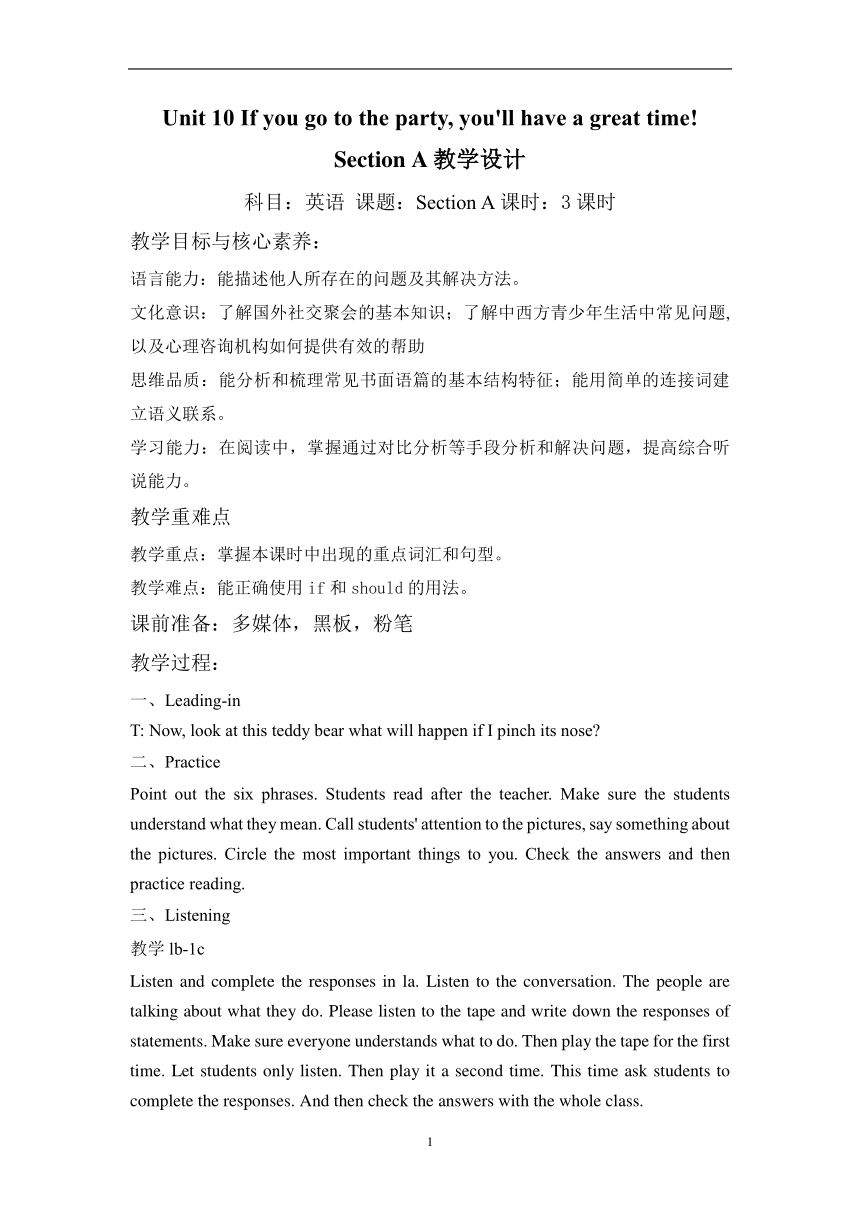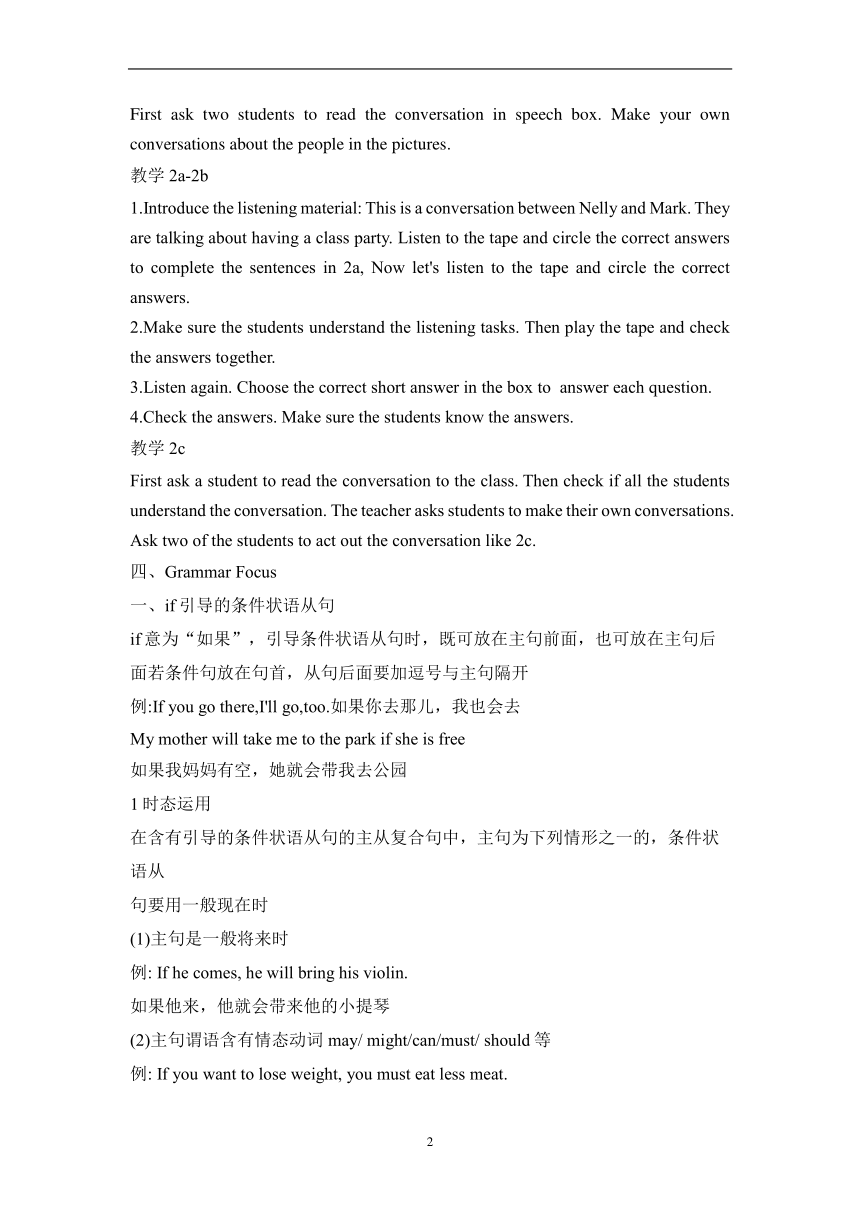Unit 10 If you go to the party, you'll have a great time Section A 教案-初中英语人教版八年级上册
文档属性
| 名称 | Unit 10 If you go to the party, you'll have a great time Section A 教案-初中英语人教版八年级上册 |  | |
| 格式 | docx | ||
| 文件大小 | 29.6KB | ||
| 资源类型 | 教案 | ||
| 版本资源 | 人教新目标(Go for it)版 | ||
| 科目 | 英语 | ||
| 更新时间 | 2023-11-23 11:40:31 | ||
图片预览


文档简介
Unit 10 If you go to the party, you'll have a great time! Section A教学设计
科目:英语 课题:Section A 课时:3课时
教学目标与核心素养:
语言能力:能描述他人所存在的问题及其解决方法。
文化意识:了解国外社交聚会的基本知识;了解中西方青少年生活中常见问题,以及心理咨询机构如何提供有效的帮助
思维品质:能分析和梳理常见书面语篇的基本结构特征;能用简单的连接词建立语义联系。
学习能力:在阅读中,掌握通过对比分析等手段分析和解决问题,提高综合听说能力。
教学重难点
教学重点:掌握本课时中出现的重点词汇和句型。
教学难点:能正确使用if和should的用法。
课前准备:多媒体,黑板,粉笔
教学过程:
Leading-in
T: Now, look at this teddy bear what will happen if I pinch its nose
二、Practice
Point out the six phrases. Students read after the teacher. Make sure the students understand what they mean. Call students' attention to the pictures, say something about
the pictures. Circle the most important things to you. Check the answers and then practice reading.
三、Listening
教学lb-1c
Listen and complete the responses in la. Listen to the conversation. The people are talking about what they do. Please listen to the tape and write down the responses of statements. Make sure everyone understands what to do. Then play the tape for the first time. Let students only listen. Then play it a second time. This time ask students to complete the responses. And then check the answers with the whole class.
First ask two students to read the conversation in speech box. Make your own conversations about the people in the pictures.
教学2a-2b
1.Introduce the listening material: This is a conversation between Nelly and Mark. They are talking about having a class party. Listen to the tape and circle the correct answers to complete the sentences in 2a, Now let's listen to the tape and circle the correct answers.
2.Make sure the students understand the listening tasks. Then play the tape and check the answers together.
3.Listen again. Choose the correct short answer in the box to answer each question.
4.Check the answers. Make sure the students know the answers.
教学2c
First ask a student to read the conversation to the class. Then check if all the students understand the conversation. The teacher asks students to make their own conversations. Ask two of the students to act out the conversation like 2c.
四、Grammar Focus
一、if引导的条件状语从句
if意为“如果”,引导条件状语从句时,既可放在主句前面,也可放在主句后面若条件句放在句首,从句后面要加逗号与主句隔开
例:If you go there,I'll go,too.如果你去那儿,我也会去
My mother will take me to the park if she is free
如果我妈妈有空,她就会带我去公园
1时态运用
在含有引导的条件状语从句的主从复合句中,主句为下列情形之一的,条件状语从
句要用一般现在时
(1)主句是一般将来时
例: If he comes, he will bring his violin.
如果他来,他就会带来他的小提琴
(2)主句谓语含有情态动词 may/ might/can/must/ should等
例: If you want to lose weight, you must eat less meat.
如果你想减肥,你必须少吃肉。
(3)主句是祈使句。
例: If you are not strong enough, please don't take part in such an activity.
如果你不够强壮,请不要参加这种活动。
2句型转换
(1)借助“祈使句+and/or+句子 (一般将来时)”这一句型来转换。其中,在句意
上and 表示顺承;or 表示转折,意为“否则”
例: If you study hard, you'll pass the exam easily. =Study hard, and you'll
pass the exam easily.努力学习,你将很容易通过考试
(2)借助 without或with 来转换条件状语从句
例: If there is no water, fish will die. =Fish will die without water
如果没有水,鱼将会死。
If you help me, I'll finish the work soon.=With your help, I'll finish the work soon.如果你帮助我,我将很快完成工作。
二、should的用法
1用法
should 为情态动词,意为“应该;应当”,后接动词原形,无人称和数的变化。常用来表示征询意见、建议、劝告、要求和义务等
(1)should 意为“应该”,表示劝告或建议
例: You should stop playing computer games.你应该停止玩电脑游戏
(2)should 表示要求或命令
例: You shouldn't fight with your classmate.你不应该和同学打架
(3)should 表示预测或可能。
例: His schoolbag should be in the classroom.他的书包可能在教室里
(4)should 有时表示说话人的感情,如惊讶、愤怒、失望等
例:Why should I go 为什么是我去
2基本式
(1)肯定句
Sb+ should+动词原形+其他
例: We should obey traffic rules. 我们应该遵守交通规则。
(2)否定句
Sb.shouldn't+动词原形+其他
例: You shouldn't smoke in the hospital.你不应该在医院里吸烟。
(3)一般疑问句
Should sb+动词原形+其他
例: Should you come here tonight 今晚你应该来这里吗
教学3a-3c
1. Fill in the blanks with the correct form of the verbs given in the passage 3a.
2. Tell Ss to work on 3b. First, read the structures below to plan your writing.
3. Let some Ss read their passages and try to find if there are any mistakes Give Ss one possible version:
4. Tell Ss to write about the other two worries. Use the structures in 3b to write a short passage.
5. Ss work by themselves and try to write a short article.
6. Ss try to write a short article with the worries in3a and the structures in 3b.
六、Language Points
1. If we ask people to bring foo od, they'll just bring potato chips and chocolate because they'll be too lazy to cook.
如果我们让大家带食物来,他们将只会带炸薯条和巧克力,因为他们太懒了,不愿意做饭。
要点精析
ask sb.to do sth意为“要求某人做某事”其否定形式为 ask sb.not to do sth.意为"要求某人不要做某事"
例:Our teacher asks us to read every day.我们的老师要求我们每天阅读
2. If I take a taxi.it will be too expensive.如果我乘出租车,那将会太昂贵
要点精析
take a taxi意为“乘出租车”
例:I sometimes take a taxi to school.我有时乘出租车去上学
知识拓展
英语中出行方式的表达
a.take +a/the+交通工具名称
例:I often take a bus to school.经常公共汽车去上学
b.by+交通工具名称
例:I go to school by bus.我乘公共汽车去上学
c.动词+to+地点名词。常用的动词有 walk,ride,drive,fly等
例: He wants to drive to the supermarket. 他想开车去超市。
d.in/on+限定词+交通工具名称
例: She goes to schoolon her bike.她骑自行车去上学
3. Can you give me some advice please 请问你能给我一些建议吗
要点精析
give sb.someadvice意为“给某人一些建议”,give s.some advice on...意为“在某方面给某人一些建议”
例:My father gave me some good advice.我父亲给了我一些好的建议
He gave me some advice on how to learn English well.
他在怎样学好英语方面给了我一些建议。
知识拓展
advice是不可数名词,表示数量时常借助于 piece或some(一些)等词
a piece of advice一条建议
two pieces of advice 两条建议
Please give me some advise. 请给我提一些建议。
七、Homework
1. 熟练掌握和运用单词。
2. 练习对话,记忆所学的语言结构
2
科目:英语 课题:Section A 课时:3课时
教学目标与核心素养:
语言能力:能描述他人所存在的问题及其解决方法。
文化意识:了解国外社交聚会的基本知识;了解中西方青少年生活中常见问题,以及心理咨询机构如何提供有效的帮助
思维品质:能分析和梳理常见书面语篇的基本结构特征;能用简单的连接词建立语义联系。
学习能力:在阅读中,掌握通过对比分析等手段分析和解决问题,提高综合听说能力。
教学重难点
教学重点:掌握本课时中出现的重点词汇和句型。
教学难点:能正确使用if和should的用法。
课前准备:多媒体,黑板,粉笔
教学过程:
Leading-in
T: Now, look at this teddy bear what will happen if I pinch its nose
二、Practice
Point out the six phrases. Students read after the teacher. Make sure the students understand what they mean. Call students' attention to the pictures, say something about
the pictures. Circle the most important things to you. Check the answers and then practice reading.
三、Listening
教学lb-1c
Listen and complete the responses in la. Listen to the conversation. The people are talking about what they do. Please listen to the tape and write down the responses of statements. Make sure everyone understands what to do. Then play the tape for the first time. Let students only listen. Then play it a second time. This time ask students to complete the responses. And then check the answers with the whole class.
First ask two students to read the conversation in speech box. Make your own conversations about the people in the pictures.
教学2a-2b
1.Introduce the listening material: This is a conversation between Nelly and Mark. They are talking about having a class party. Listen to the tape and circle the correct answers to complete the sentences in 2a, Now let's listen to the tape and circle the correct answers.
2.Make sure the students understand the listening tasks. Then play the tape and check the answers together.
3.Listen again. Choose the correct short answer in the box to answer each question.
4.Check the answers. Make sure the students know the answers.
教学2c
First ask a student to read the conversation to the class. Then check if all the students understand the conversation. The teacher asks students to make their own conversations. Ask two of the students to act out the conversation like 2c.
四、Grammar Focus
一、if引导的条件状语从句
if意为“如果”,引导条件状语从句时,既可放在主句前面,也可放在主句后面若条件句放在句首,从句后面要加逗号与主句隔开
例:If you go there,I'll go,too.如果你去那儿,我也会去
My mother will take me to the park if she is free
如果我妈妈有空,她就会带我去公园
1时态运用
在含有引导的条件状语从句的主从复合句中,主句为下列情形之一的,条件状语从
句要用一般现在时
(1)主句是一般将来时
例: If he comes, he will bring his violin.
如果他来,他就会带来他的小提琴
(2)主句谓语含有情态动词 may/ might/can/must/ should等
例: If you want to lose weight, you must eat less meat.
如果你想减肥,你必须少吃肉。
(3)主句是祈使句。
例: If you are not strong enough, please don't take part in such an activity.
如果你不够强壮,请不要参加这种活动。
2句型转换
(1)借助“祈使句+and/or+句子 (一般将来时)”这一句型来转换。其中,在句意
上and 表示顺承;or 表示转折,意为“否则”
例: If you study hard, you'll pass the exam easily. =Study hard, and you'll
pass the exam easily.努力学习,你将很容易通过考试
(2)借助 without或with 来转换条件状语从句
例: If there is no water, fish will die. =Fish will die without water
如果没有水,鱼将会死。
If you help me, I'll finish the work soon.=With your help, I'll finish the work soon.如果你帮助我,我将很快完成工作。
二、should的用法
1用法
should 为情态动词,意为“应该;应当”,后接动词原形,无人称和数的变化。常用来表示征询意见、建议、劝告、要求和义务等
(1)should 意为“应该”,表示劝告或建议
例: You should stop playing computer games.你应该停止玩电脑游戏
(2)should 表示要求或命令
例: You shouldn't fight with your classmate.你不应该和同学打架
(3)should 表示预测或可能。
例: His schoolbag should be in the classroom.他的书包可能在教室里
(4)should 有时表示说话人的感情,如惊讶、愤怒、失望等
例:Why should I go 为什么是我去
2基本式
(1)肯定句
Sb+ should+动词原形+其他
例: We should obey traffic rules. 我们应该遵守交通规则。
(2)否定句
Sb.shouldn't+动词原形+其他
例: You shouldn't smoke in the hospital.你不应该在医院里吸烟。
(3)一般疑问句
Should sb+动词原形+其他
例: Should you come here tonight 今晚你应该来这里吗
教学3a-3c
1. Fill in the blanks with the correct form of the verbs given in the passage 3a.
2. Tell Ss to work on 3b. First, read the structures below to plan your writing.
3. Let some Ss read their passages and try to find if there are any mistakes Give Ss one possible version:
4. Tell Ss to write about the other two worries. Use the structures in 3b to write a short passage.
5. Ss work by themselves and try to write a short article.
6. Ss try to write a short article with the worries in3a and the structures in 3b.
六、Language Points
1. If we ask people to bring foo od, they'll just bring potato chips and chocolate because they'll be too lazy to cook.
如果我们让大家带食物来,他们将只会带炸薯条和巧克力,因为他们太懒了,不愿意做饭。
要点精析
ask sb.to do sth意为“要求某人做某事”其否定形式为 ask sb.not to do sth.意为"要求某人不要做某事"
例:Our teacher asks us to read every day.我们的老师要求我们每天阅读
2. If I take a taxi.it will be too expensive.如果我乘出租车,那将会太昂贵
要点精析
take a taxi意为“乘出租车”
例:I sometimes take a taxi to school.我有时乘出租车去上学
知识拓展
英语中出行方式的表达
a.take +a/the+交通工具名称
例:I often take a bus to school.经常公共汽车去上学
b.by+交通工具名称
例:I go to school by bus.我乘公共汽车去上学
c.动词+to+地点名词。常用的动词有 walk,ride,drive,fly等
例: He wants to drive to the supermarket. 他想开车去超市。
d.in/on+限定词+交通工具名称
例: She goes to schoolon her bike.她骑自行车去上学
3. Can you give me some advice please 请问你能给我一些建议吗
要点精析
give sb.someadvice意为“给某人一些建议”,give s.some advice on...意为“在某方面给某人一些建议”
例:My father gave me some good advice.我父亲给了我一些好的建议
He gave me some advice on how to learn English well.
他在怎样学好英语方面给了我一些建议。
知识拓展
advice是不可数名词,表示数量时常借助于 piece或some(一些)等词
a piece of advice一条建议
two pieces of advice 两条建议
Please give me some advise. 请给我提一些建议。
七、Homework
1. 熟练掌握和运用单词。
2. 练习对话,记忆所学的语言结构
2
同课章节目录
- Unit 1 Where did you go on vacation?
- Section A
- Section B
- Unit 2 How often do you exercise?
- Section A
- Section B
- Unit 3 I'm more outgoing than my sister.
- Section A
- Section B
- Unit 4 What's the best movie theater?
- Section A
- Section B
- Unit 5 Do you want to watch a game show?
- Section A
- Section B
- Unit 6 I'm going to study computer science.
- Section A
- Section B
- Unit 7 Will people have robots?
- Section A
- Section B
- Unit 8 How do you make a banana milk shake?
- Section A
- Section B
- Unit 9 Can you come to my party?
- Section A
- Section B
- Unit 10 If you go to the party, you'll have a grea
- Section A
- Section B
